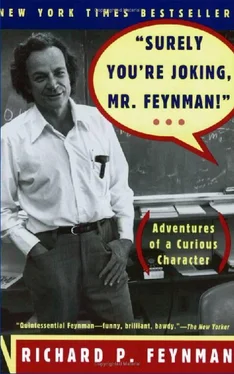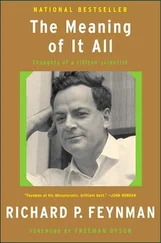Later I attended a lecture at the engineering school. The lecture went like this, translated into English: “Two bodies … are considered equivalent … if equal torques … will produce … equal acceleration. Two bodies, are considered equivalent, if equal torques, will produce equal acceleration.” The students were all sitting there taking dictation, and when the professor repeated the sentence, they checked it to make sure they wrote it down all right. Then they wrote down the next sentence, and on and on. I was the only one who knew the professor was talking about objects with the same moment of inertia, and it was hard to figure out.
I didn’t see how they were going to learn anything from that. Here he was talking about moments of inertia, but there was no discussion about how hard it is to push a door open when you put heavy weights on the outside, compared to when you put them near the hinge— nothing!
After the lecture, I talked to a student: “You take all those notes—what do you do with them?”
“Oh, we study them,” he says. “We’ll have an exam.”
“What will the exam be like?”
“Very easy. I can tell you now one of the questions.” He looks at his notebook and says, “ ‘When are two bodies equivalent?’ And the answer is, ‘Two bodies are considered equivalent if equal torques will produce equal acceleration.’ So, you see, they could pass the examinations, and “learn” all this stuff, and not know anything at all, except what they had memorized.
Then I went to an entrance exam for students coming into the engineering school. It was an oral exam, and I was allowed to listen to it. One of the students was absolutely super: He answered everything nifty! The examiners asked him what diamagnetism was, and he answered it perfectly. Then they asked, “When light comes at an angle through a sheet of material with a certain thickness, and a certain index N, what happens to the light?”
“It comes out parallel to itself, sir—displaced.”
“And how much is it displaced?”
“I don’t know, sir, but I can figure it out.” So he figured it out. He was very good. But I had, by this time, my suspicions.
After the exam I went up to this bright young man, and explained to him that I was from the United States, and that I wanted to ask him some questions that would not affect the result of his examination in any way. The first question I ask is, “Can you give me some example of a diamagnetic substance?”
“No.”
Then I asked, “If this book was made of glass, and I was looking at something on the table through it, what would happen to the image if I tilted the glass?”
“It would be deflected, sir, by twice the angle that you’ve turned the book.”
I said, “You haven’t got it mixed up with a mirror, have you?”
“No, sir!”
He had just told me in the examination that the light would be displaced, parallel to itself, and therefore the image would move over to one side, but would not be turned by any angle. He had even figured out how much it would be displaced, but he didn’t realize that a piece of glass is a material with an index, and that his calculation had applied to my question.
I taught a course at the engineering school on mathematical methods in physics, in which I tried to show how to solve problems by trial and error. It’s something that people don’t usually learn, so I began with some simple examples of arithmetic to illustrate the method. I was surprised that only about eight out of the eighty or so students turned in the first assignment. So I gave a strong lecture about having to actually try it, not just sit back and watch me do it.
After the lecture some students came up to me in a little delegation, and told me that I didn’t understand the backgrounds that they have, that they can study without doing the problems, that they have already learned arithmetic, and that this stuff was beneath them.
So I kept going with the class, and no matter how complicated or obviously advanced the work was becoming, they were never handing a damn thing in. Of course I realized what it was: They couldn’t do it!
One other thing I could never get them to do was to ask questions. Finally, a student explained it to me: “If I ask you a question during the lecture, afterwards everybody will be telling me, ‘What are you wasting our time for in the class? We’re trying to learn something. And you’re stopping him by asking a question’.”
It was a kind of one-upmanship, where nobody knows what’s going on, and they’d put the other one down as if they did know. They all fake that they know, and if one student admits for a moment that something is confusing by asking a question, the others take a high-handed attitude, acting as if it’s not confusing at all, telling him that he’s wasting their time.
I explained how useful it was to work together, to discuss the questions, to talk it over, but they wouldn’t do that either, because they would be losing face if they had to ask someone else. It was pitiful! All the work they did, intelligent people, but they got themselves into this funny state of mind, this strange kind of self-propagating “education” which is meaningless, utterly meaningless!
At the end of the academic year, the students asked me to give a talk about my experiences of teaching in Brazil. At the talk there would be not only students, but professors and government officials, so I made them promise that I could say whatever I wanted. They said, “Sure. Of course. It’s a free country.”
So I came in, carrying the elementary physics textbook that they used in the first year of college. They thought this book was especially good because it had different kinds of typeface—bold black for the most important things to remember, lighter for less important things, and so on.
Right away somebody said, “You’re not going to say anything bad about the textbook, are you? The man who wrote it is here, and everybody thinks it’s a good textbook.”
“You promised I could say whatever I wanted.”
The lecture hall was full. I started out by defining science as an understanding of the behavior of nature. Then I asked, “What is a good reason for teaching science? Of course, no country can consider itself civilized unless … yak, yak, yak.” They were all sitting there nodding, because I know that’s the way they think.
Then I say, “That, of course, is absurd, because why should we feel we have to keep up with another country? We have to do it for a good reason, a sensible reason; not just because other countries do.” Then I talked about the utility of science, and its contribution to the improvement of the human condition, and all that—I really teased them a little bit.
Then I say, “The main purpose of my talk is to demonstrate to you that no science is being taught in Brazil!”
I can see them stir, thinking, “What? No science? This is absolutely crazy! We have all these classes.”
So I tell them that one of the first things to strike me when I came to Brazil was to see elementary school kids in bookstores, buying physics books. There are so many kids learning physics in Brazil, beginning much earlier than kids do in the United States, that it’s amazing you don’t find many physicists in Brazil—why is that? So many kids are working so hard, and nothing comes of it.
Then I gave the analogy of a Greek scholar who loves the Greek language, who knows that in his own country there aren’t many children studying Greek. But he comes to another country, where he is delighted to find everybody studying Greek—even the smaller kids in the elementary schools. He goes to the examination of a student who is coming to get his degree in Greek, and asks him, “What were Socrates’ ideas on the relationship between Truth and Beauty?”—and the student can’t answer. Then he asks the student, What did Socrates say to Plato in the Third Symposium?” the student lights up and goes, “Brrrrrrrrr-up” —he tells you everything, word for word, that Socrates said, in beautiful Greek.
Читать дальше












